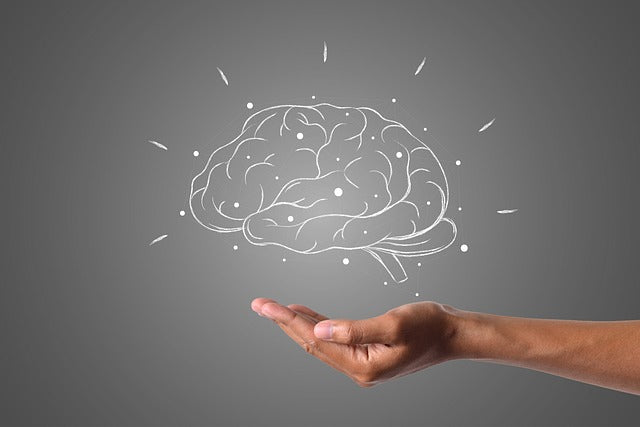How to Stay Balanced and Energized This Holiday Season
Eat Mindfully This Holiday Season
The holidays just wouldn't be the same without all the good food we prepare – roasted turkey, glazed ham, marshmallow-smothered sweet potatoes, pumpkin pie, cookies, etc. However, going off the rails with indulgent, sugary foods over the holidays can result in unwanted consequences such as fatigue, lethargy, and the need to loosen your belt a few extra notches! The good news is that you can enjoy holiday foods without harming your health by engaging in a simple but effective strategy – mindful eating!
Mindful eating describes the practice of being present while you eat, thoroughly enjoying your food while also tuning in to your body's natural hunger and satiety signals. Mindful eating during the holiday season allows you to enjoy special foods while also reducing cravings and preventing overeating to the point of discomfort.1
This holiday season, practice mindful eating by selecting a few favorite foods and beverages to indulge in at gatherings – maybe you have a soft spot for eggnog or gingerbread – and sticking to a healthy, whole foods-based diet the rest of the time. For example, at your holiday dinner, fill your plate with protein such as turkey, lots of vegetables, and some complex carbs (think sweet potatoes minus the marshmallow topping) and then have a cookie or two and some eggnog for dessert.
Another smart idea is to bring your own delicious but healthy dish to holiday gatherings; this will provide you with a wholesome option while also showing your friends and family just how delicious whole, nutrient-dense foods can be!
Last but not least, make sure to chew your food well at each meal, as this will naturally slow down your eating process, moderate your food intake, and enhance satiety.2,3 You may also consider going on walks after large meals, as this practice has been found to attenuate the blood sugar response to meals and promote metabolic health.4
Sleep
With all the social gatherings over the holiday season, it’s easy to skimp on sleep! However, that doesn’t mean you should! Sleep deprivation impairs the immune system, increasing your risk of the sniffles. It also induces low mood, anxious feelings, and irritability and increases cravings for unhealthy foods. Altogether, sleep deprivation is a recipe for poor health!5,6
Conversely, getting plenty of sleep over the holidays will help you maintain a robust immune system and a positive mood, so you can enjoy the holidays in good spirits.7
To get plenty of restorative sleep throughout the holiday season, create a healthy bedtime routine. On evenings that you are at home, wear blue-light-blocking glasses for 1-2 hours before bed; this will optimize your production of melatonin, a critical sleep-inducing hormone. Once you are in bed, aim for seven to eight hours of uninterrupted sleep. Make sure that your bedroom is completely dark, as even a minor amount of light pollution from outside sources and digital devices can hamper sleep quality. If you are traveling this holiday season, bring along an eye mask so you can sleep in complete darkness at night.
If you need to travel across time zones or have lots of late nights, consider supplementing with melatonin to support a healthy sleep cycle.
Move Your Body!
 The cold weather and shorter days around the holiday season make most people want to curl up on the couch, forgoing physical activity. However, avoiding physical activity will only make it harder to get back into a healthy exercise routine after the holidays.
The cold weather and shorter days around the holiday season make most people want to curl up on the couch, forgoing physical activity. However, avoiding physical activity will only make it harder to get back into a healthy exercise routine after the holidays.
Staying active over the holidays has many benefits: Exercise may help you fend off illness-causing bacteria and viruses, boost your mood, and make you more resilient to stress.8,9
Importantly, instead of viewing exercise as punishment for holiday indulgences or a way to lose weight, see it as a way to keep your whole body in good health. This healthier mindset may make you more likely to stick to a consistent exercise routine over the holidays and throughout the entire year.10,11 Find forms of movement that make you happy, whether its cross-country skiing or swimming at the local rec center.
Cultivate a Healthy Holiday Mindset
Between demanding schedules, financial concerns, and touchy family dynamics, the holidays can be stressful. In fact, the stress associated with the holiday season may explain why the incidence of heart attacks spikes this time of year! Fortunately, there are many ways you can manage your holiday stress:
- Prime your brain for a happy holiday season. Set an intention to enjoy the holidays as much as you can, no matter what stressful situations you may face. Setting a positive intention can prime your brain for positivity, causing you to unconsciously seek and create positive experiences in your life.
- Savor the good experiences. Rather than letting the holidays fly by in a blur, savor the special moments that occur.
- Give yourself permission to take a break! If you’re feeling burnt out and need to leave a holiday party early, or simply need a few hours away from your family for "personal time," give yourself permission to do so. Take time to go on a walk, read a good book, or practice yoga. Your nervous system will thank you!
- Practice gratitude. The holiday season is a perfect time to start a gratitude journal! Consciously reflecting on the blessings in your life may alleviate feelings of anxiety and low mood and help you enjoy the holiday season more fully.12
- Have fun! While you probably don’t need scientists to tell you this, research has found that play is essential for our health and makes it easier for us to cope with stress!13 Keep your body and mind well this holiday season by engaging in your favorite forms of play, whether that includes baking, making music, or playing outside in the snow.
Boost Your Energy and Stamina with NMN
Even if you engage in all the healthy habits we’ve discussed thus far, you may still find yourself needing an extra “boost” of energy over the holidays! Enhancing your NAD+ status with NAD+ precursors can help!
NAD (nicotinamide adenine dinucleotide) is a critical molecule involved in energy production, DNA repair, genomic signaling, and cell survival. It naturally declines as we age but may also be decreased by chronic stress. As scientists have come to understand the significance of NAD for our overall health, research has exploded on ways to boost cellular levels of NAD. One of the best ways to boost your cellular NAD+ levels is by supplementing with NMN (nicotinamide mononucleotide), a direct, stable precursor to NAD+.
NMN is carried into cells via its own dedicated transporters and, when packaged in liposomes, through diffusion across the phospholipid bilayer of cell membranes. Supplemental NMN has been found to boost energy and stamina14 and may, therefore, give you the energy you need to sail through the holiday season with ease.
Rehydrate Your Body with Deep-Sea Minerals
With all the sugar and alcohol we consume around the holidays, it is easy to inadvertently fall into a state of dehydration. Excessive sugar consumption can cause dehydration by raising blood sugar levels, which triggers the kidneys to excrete more water and electrolytes in an attempt to remove glucose in the urine.15
Alcohol, on the other hand, promotes dehydration by reducing your brain’s production of vasopressin, a hormone that causes your body to hold onto water. As a result of low vasopressin, alcohol causes your body to eliminate excess water, inciting dehydration.16
Dehydration is known to cause fatigue and may put a damper on your holiday spirit. Fortunately, you can rapidly rehydrate your cells after holiday overindulgences with deep-sea minerals - minerals extracted from pure, cold, deep-sea waters. Deep-sea minerals have been found to rehydrate the body more efficiently than tap water and sports drinks, which often are loaded with sugar and additives that you should avoid anyway!17
B12 for Energy Support
Round out your energy-boosting protocol this holiday season with vitamin B12, a member of the B vitamin family that is a crucial cofactor in energy-generating pathways.18 Research shows that many people are in the early stages of B12 deficiency, setting themselves up for fatigue, low mood, and cognitive impairment.19 The reasons for low B12 status are many, but may include insufficient stomach acid production – stomach acid is required for vitamin B12 absorption – due to the use of antacids and proton pump inhibitors, and intestinal dysbiosis.20,21
With typical encapsulated vitamin B12 supplements, high doses are required to achieve optimal levels in the body. However, nanoliposomal delivery systems significantly enhance B12 bioavailability and may provide a more rapid boost in energy.22
References
- Brewer JA, et al. Can mindfulness address maladaptive eating behaviors? Why traditional diet plans fail and how new mechanistic insights may lead to novel interventions. Front Psychol. 2018; 9: 1418.
- Miquel-Kergoat S, et al. Effects of chewing on appetite, food intake and gut hormones: A systematic review and meta-analysis. Physiol Behav. 2015; 151(1): 88-96.
- Hawton K, et al. Slow down: Behavioural and physiological effects of reducing eating rate. Nutrients. 2019; 11(1): 50.
- Reynolds AN, Venn BJ. The timing of activity after eating affects the glycaemic response of healthy adults: A randomised controlled trial. Nutrients. 2018. 10(11): 1743.
- Talbot LS, et al. Sleep deprivation in adolescents and adults: Changes in affect. Emotion. 2010; 10(6): 831-841.
- Yang CL, et al. Increased hunger, food cravings, food reward, and portion size selection after sleep curtailment in women without obesity. Nutrients. 2019; 11(3): 663.
- Asif N, et al. Human immune system during sleep. Am J Clin Exp Immunol. 2017; 6(6): 92-96.
- Campbell JP, Turner JE. Debunking the myth of exercise-induced immune suppression: Redefining the impact of exercise on immunological health across the lifespan. Front Immunol. 2018; 9: 648.
- Childs E, de Wit H. Regular exercise is associated with emotional resilience to acute stress in healthy adults. Front Physiol. 2014; 5: 161.
- Orvidas K, et al. Mindsets applied to fitness: Growth beliefs predict exercise efficacy, value and frequency. Psychol Sport Exerc. 2018; 36: 156-161.
- Segar M, et al. Rethinking physical activity communication: using focus groups to understand women’s goals, values, and beliefs to improve public health. BMC Public Health. 2017; 17: 462.
- Wood AM, et al. Gratitude and well-being: A review and theoretical integration. Clin Psychol Rev. 2010; 30(7): 890-905.
- Magnuson CD, Barnett LA. The playful advantage: How playfulness enhances coping with stress. Leisure Sci. 2013; 35(2): 129-144.
- Yoshino J, et al. NAD+ intermediates: The biology and therapeutic potential of NMN and NR. Cell Metab. 2018; 27(3): 513-528.
- Baldrighi M, et al. Hyperglycemic hyperosmolar state: A pragmatic approach to properly manage sodium derangements. Curr Diabetes Rev. 2018; 14(6): 534-541.
- Roberts KE. Mechanism of dehydration following alcohol ingestion. Arch Intern Med. 1963. 112(2): 154-157.
- Keen DA, et al. The impact of post-exercise hydration with deep-ocean mineral water on rehydration and exercise performance. J Int Soc Sports Nutr. 2016; 13: 17.
- O’Leary F, Samman S. Vitamin B12 in health and disease. Nutrients. 2010; 2(3): 299-316.
- Hannibal L, et al. Biomarkers and algorithms for the diagnosis of vitamin B12 deficiency. Front Mol Biosci. 2016; 3: 27.
- Heidelbaugh JJ. Proton pump inhibitors and risk of vitamin and mineral deficiency: evidence and clinical implications. Ther Adv Drug Saf. 2013; 4(3): 125-133.
- Rowley CA, et al. To B12 or not to B12: Five questions on the role of cobalamin in host-microbial interactions. PLoS Pathog. 2019; 15(1): e1007479.
- Vitetta L, et al. Route and type of formulation administered influences the absorption and disposition of vitamin B12 levels in serum. J Funct Biomater. 2018; 9(1): 12.




